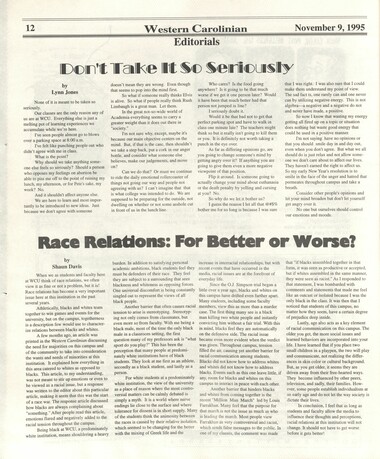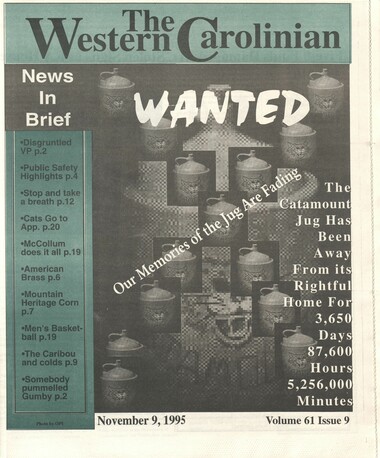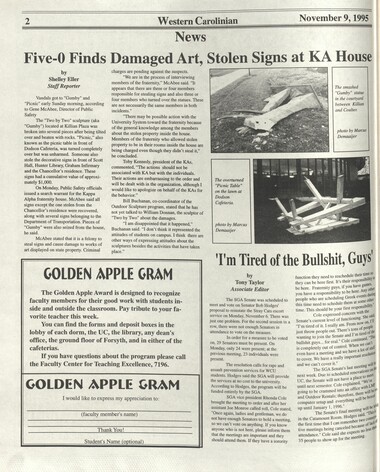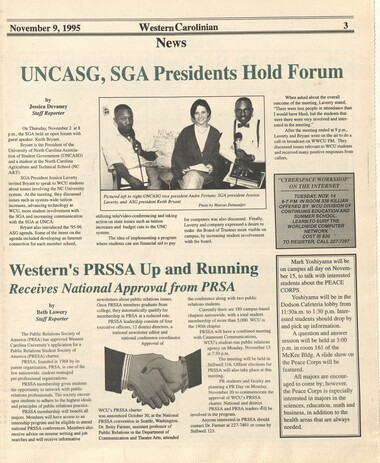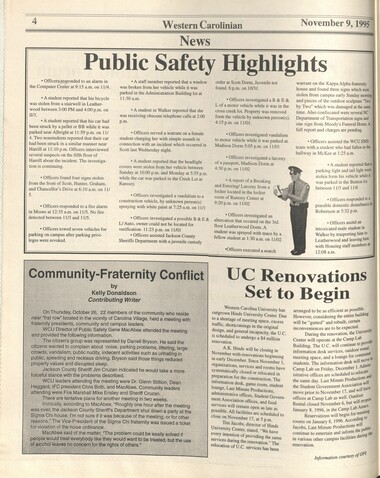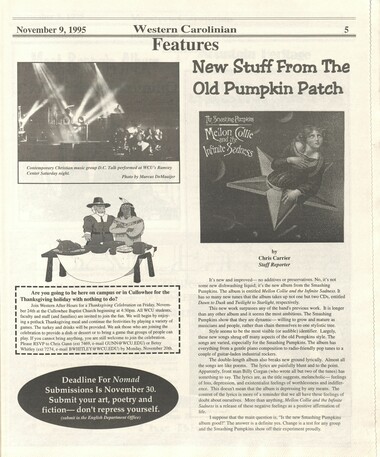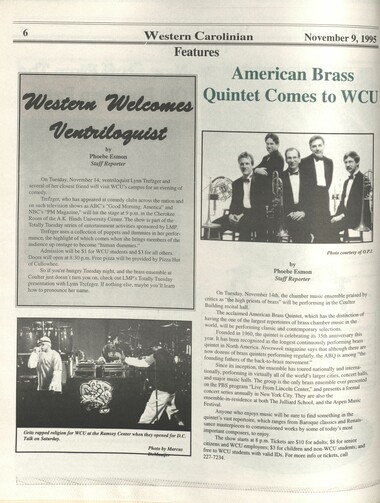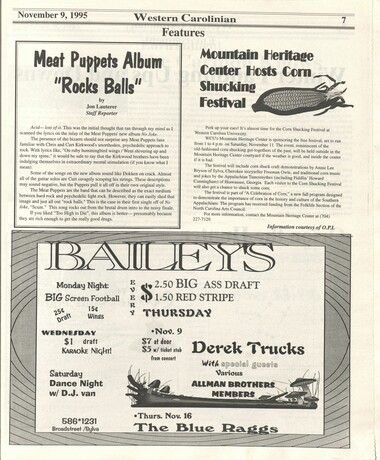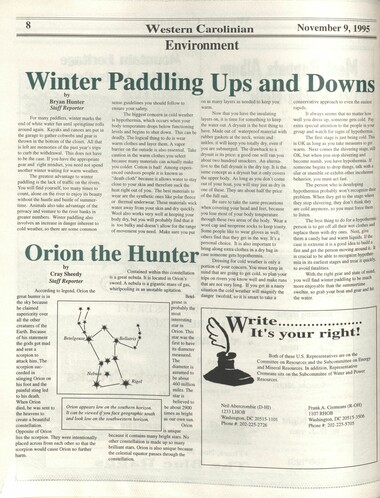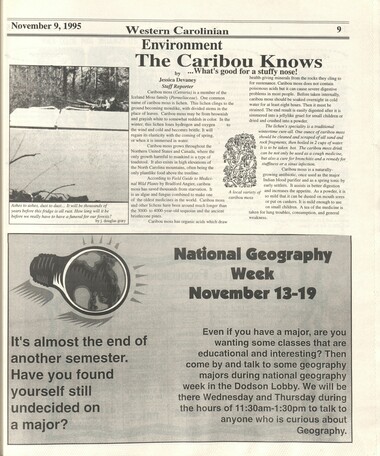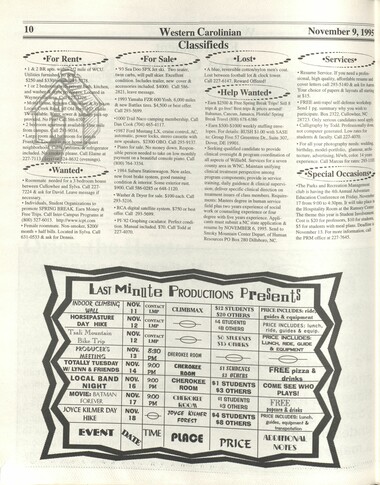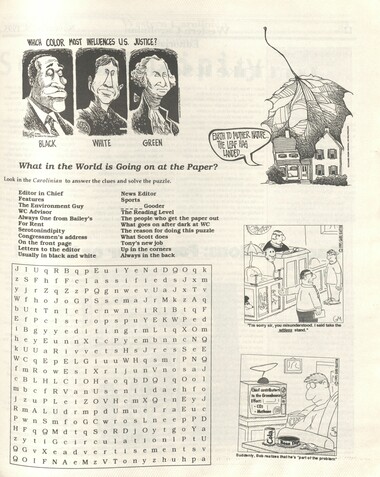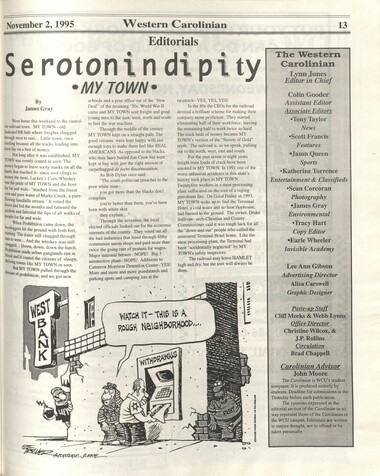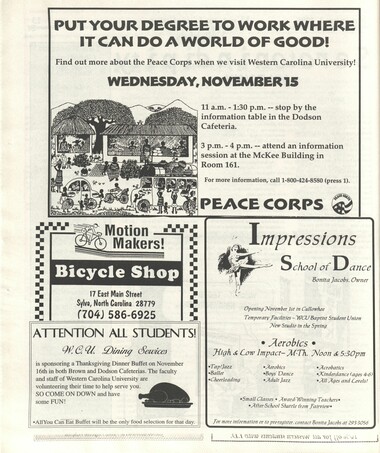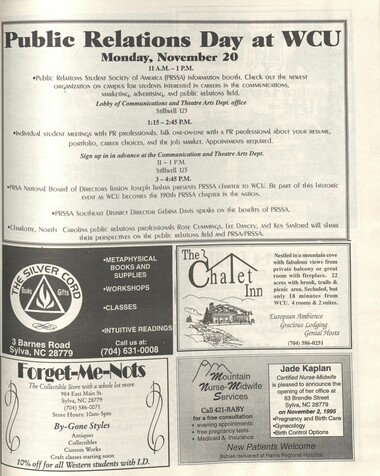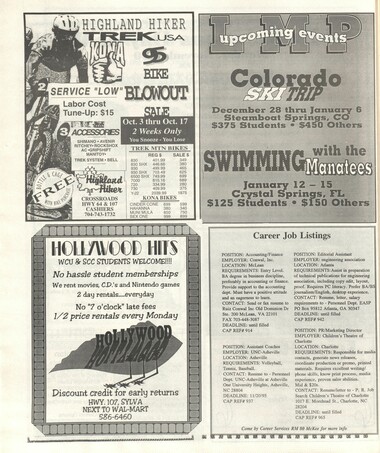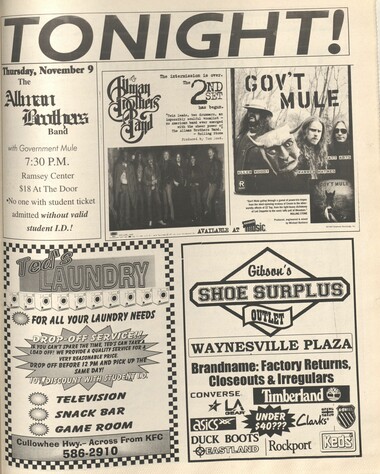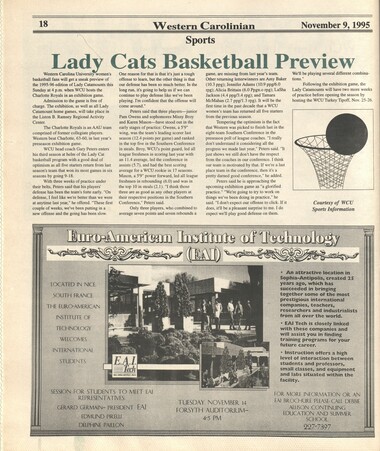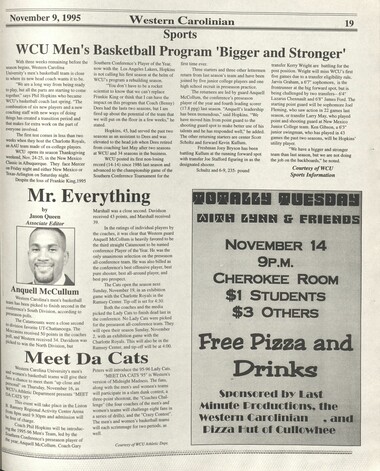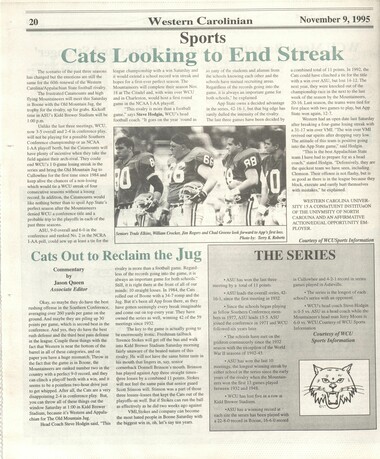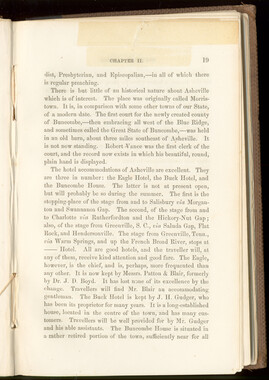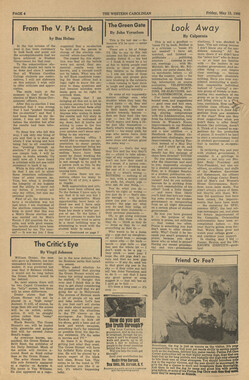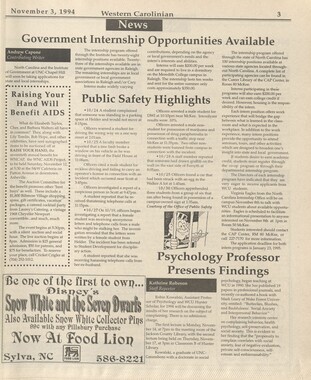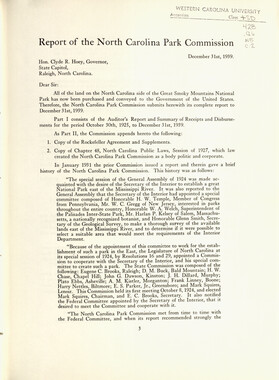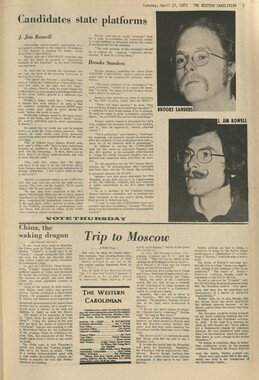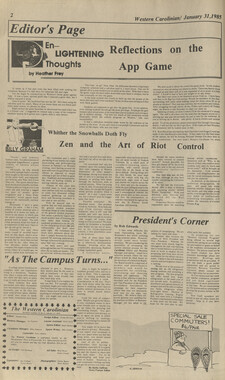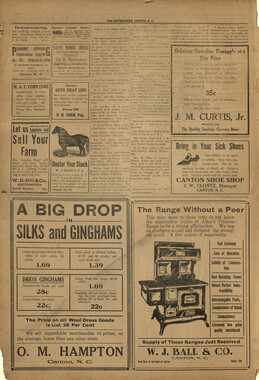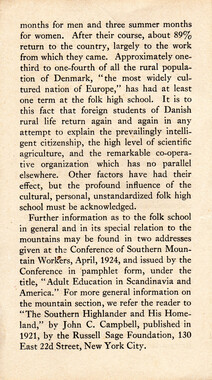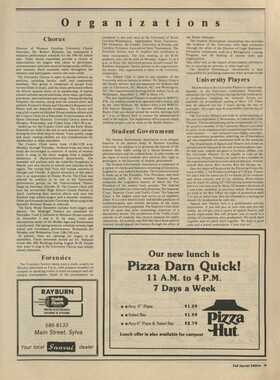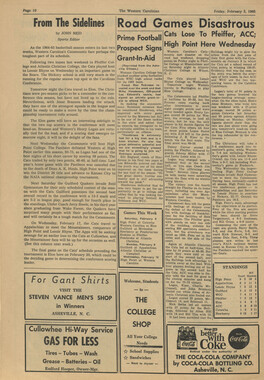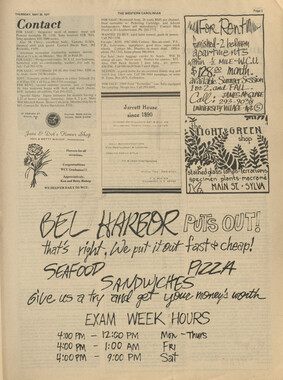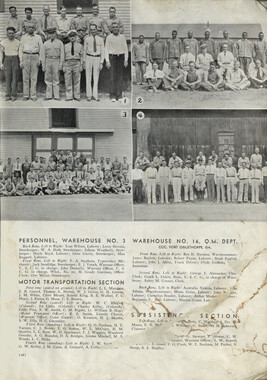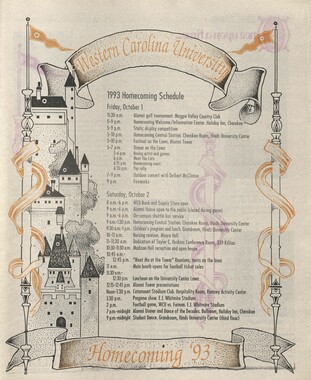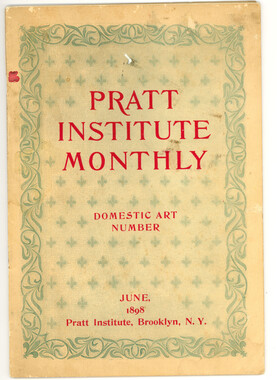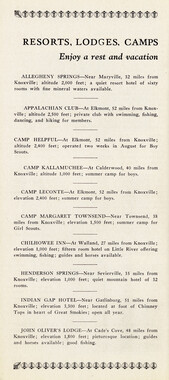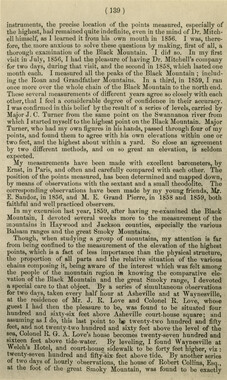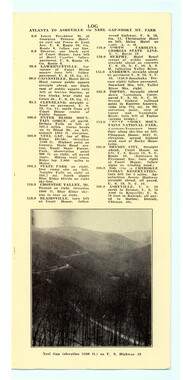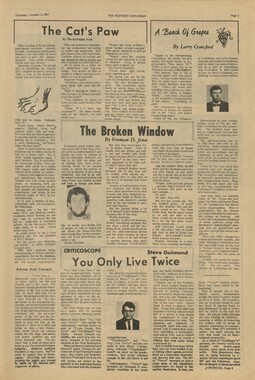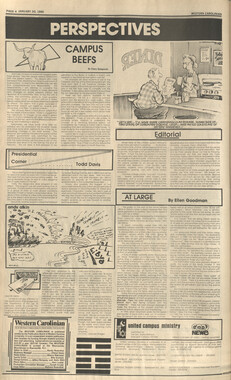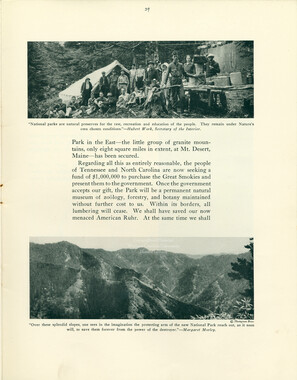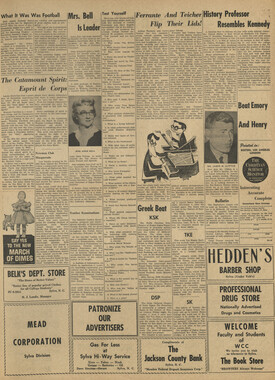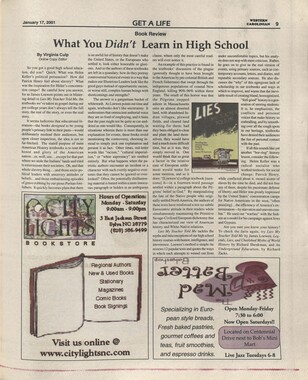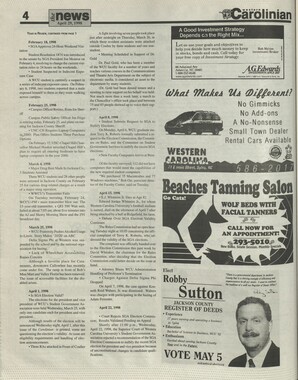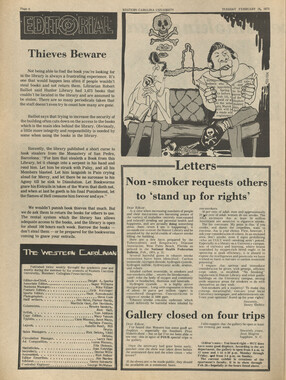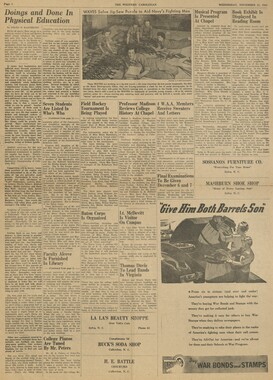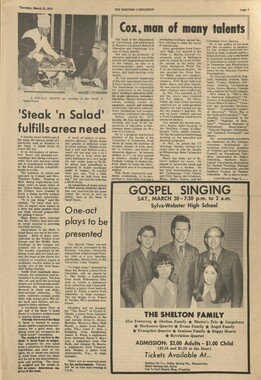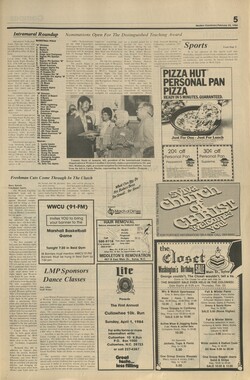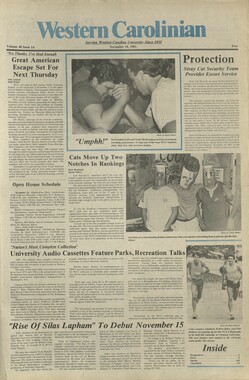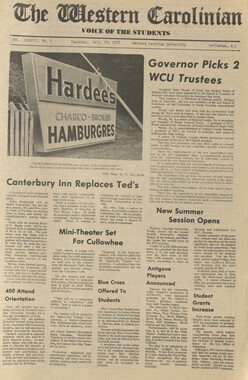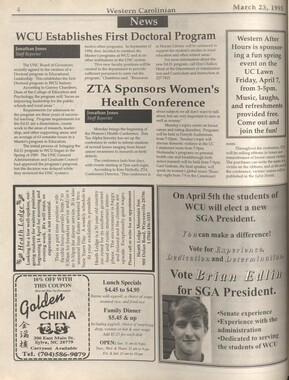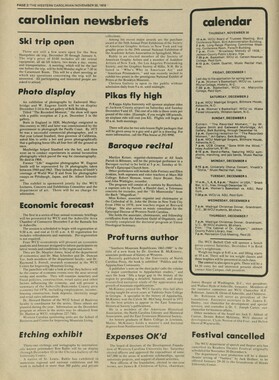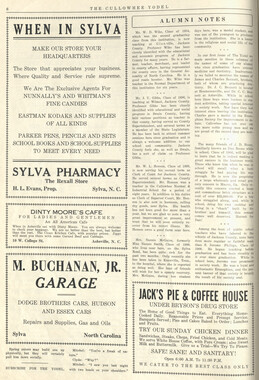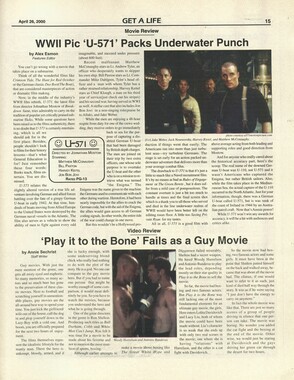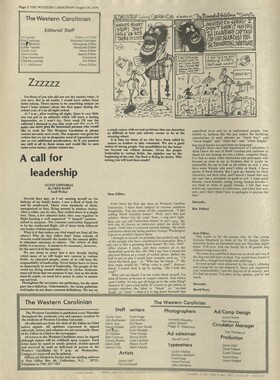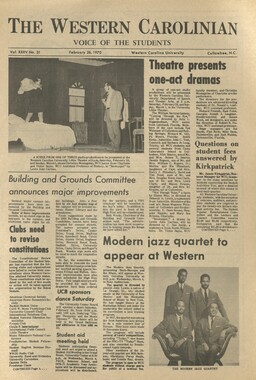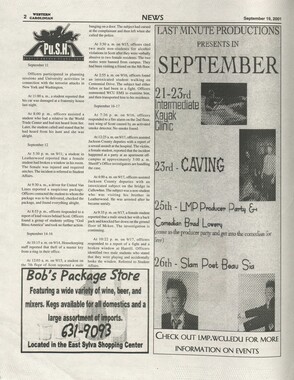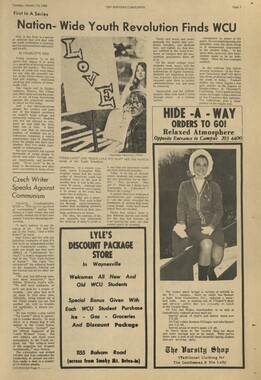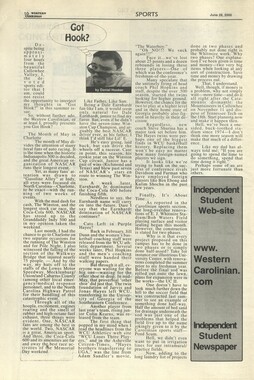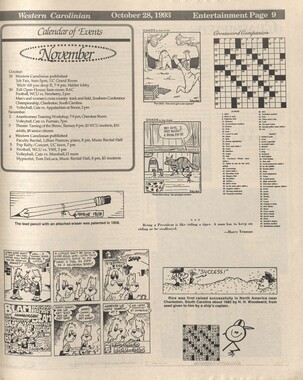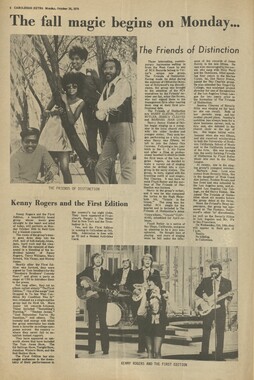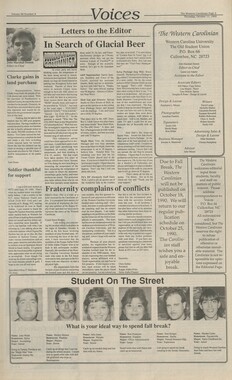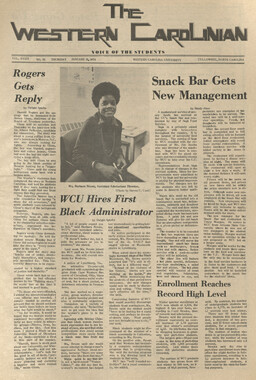Western Carolina University (20)
View all
- Canton Champion Fibre Company (2308)
- Cherokee Traditions (293)
- Civil War in Southern Appalachia (165)
- Craft Revival (1942)
- Great Smoky Mountains - A Park for America (2767)
- Highlights from Western Carolina University (430)
- Horace Kephart (941)
- Journeys Through Jackson (154)
- LGBTQIA+ Archive of Jackson County (26)
- Oral Histories of Western North Carolina (314)
- Picturing Appalachia (6772)
- Stories of Mountain Folk (413)
- Travel Western North Carolina (160)
- Western Carolina University Fine Art Museum Vitreograph Collection (129)
- Western Carolina University Herbarium (92)
- Western Carolina University: Making Memories (708)
- Western Carolina University Publications (2283)
- Western Carolina University Restricted Electronic Theses and Dissertations (146)
- Western North Carolina Regional Maps (71)
- World War II in Southern Appalachia (131)
University of North Carolina Asheville (6)
View all
- Allanstand Cottage Industries (62)
- Appalachian National Park Association (53)
- Bennett, Kelly, 1890-1974 (1388)
- Berry, Walter (76)
- Brasstown Carvers (40)
- Carver, George Washington, 1864?-1943 (26)
- Cathey, Joseph, 1803-1874 (1)
- Champion Fibre Company (233)
- Champion Paper and Fibre Company (297)
- Cherokee Indian Fair Association (16)
- Cherokee Language Program (22)
- Crowe, Amanda (40)
- Edmonston, Thomas Benton, 1842-1907 (7)
- Ensley, A. L. (Abraham Lincoln), 1865-1948 (275)
- Fromer, Irving Rhodes, 1913-1994 (70)
- George Butz (BFS 1907) (46)
- Goodrich, Frances Louisa (120)
- Grant, George Alexander, 1891-1964 (96)
- Heard, Marian Gladys (60)
- Kephart, Calvin, 1883-1969 (15)
- Kephart, Horace, 1862-1931 (313)
- Kephart, Laura, 1862-1954 (39)
- Laney, Gideon Thomas, 1889-1976 (439)
- Masa, George, 1881-1933 (61)
- McElhinney, William Julian, 1896-1953 (44)
- Niggli, Josephina, 1910-1983 (10)
- North Carolina Park Commission (105)
- Osborne, Kezia Stradley (9)
- Owens, Samuel Robert, 1918-1995 (11)
- Penland Weavers and Potters (36)
- Roberts, Vivienne (15)
- Roth, Albert, 1890-1974 (142)
- Schenck, Carl Alwin, 1868-1955 (1)
- Sherrill's Photography Studio (2565)
- Southern Highland Handicraft Guild (127)
- Southern Highlanders, Inc. (71)
- Stalcup, Jesse Bryson (46)
- Stearns, I. K. (213)
- Thompson, James Edward, 1880-1976 (226)
- United States. Indian Arts and Crafts Board (130)
- USFS (683)
- Vance, Zebulon Baird, 1830-1894 (1)
- Weaver, Zebulon, 1872-1948 (58)
- Western Carolina College (230)
- Western Carolina Teachers College (282)
- Western Carolina University (1794)
- Western Carolina University. Mountain Heritage Center (18)
- Whitman, Walt, 1819-1892 (10)
- Wilburn, Hiram Coleman, 1880-1967 (73)
- Williams, Isadora (3)
- Cain, Doreyl Ammons (0)
- Crittenden, Lorraine (0)
- Rhodes, Judy (0)
- Smith, Edward Clark (0)
- Appalachian Region, Southern (2399)
- Asheville (N.C.) (1917)
- Avery County (N.C.) (26)
- Blount County (Tenn.) (161)
- Buncombe County (N.C.) (1671)
- Cherokee County (N.C.) (283)
- Clay County (N.C.) (555)
- Graham County (N.C.) (233)
- Great Smoky Mountains National Park (N.C. and Tenn.) (510)
- Haywood County (N.C.) (3522)
- Henderson County (N.C.) (70)
- Jackson County (N.C.) (4692)
- Knox County (Tenn.) (25)
- Knoxville (Tenn.) (12)
- Lake Santeetlah (N.C.) (10)
- Macon County (N.C.) (420)
- Madison County (N.C.) (211)
- McDowell County (N.C.) (39)
- Mitchell County (N.C.) (132)
- Polk County (N.C.) (35)
- Qualla Boundary (981)
- Rutherford County (N.C.) (76)
- Swain County (N.C.) (2113)
- Transylvania County (N.C.) (247)
- Watauga County (N.C.) (12)
- Waynesville (N.C.) (73)
- Yancey County (N.C.) (72)
- Aerial Photographs (3)
- Aerial Views (60)
- Albums (books) (4)
- Articles (1)
- Artifacts (object Genre) (228)
- Bibliographies (1)
- Biography (general Genre) (2)
- Cards (information Artifacts) (38)
- Clippings (information Artifacts) (191)
- Crafts (art Genres) (622)
- Depictions (visual Works) (21)
- Design Drawings (1)
- Drawings (visual Works) (184)
- Envelopes (73)
- Facsimiles (reproductions) (1)
- Fiction (general Genre) (4)
- Financial Records (12)
- Fliers (printed Matter) (67)
- Glass Plate Negatives (381)
- Guidebooks (2)
- Internegatives (10)
- Interviews (812)
- Land Surveys (102)
- Letters (correspondence) (1013)
- Manuscripts (documents) (619)
- Maps (documents) (177)
- Memorandums (25)
- Minutes (administrative Records) (59)
- Negatives (photographs) (5835)
- Newsletters (1285)
- Newspapers (2)
- Occupation Currency (1)
- Paintings (visual Works) (1)
- Pen And Ink Drawings (1)
- Periodicals (193)
- Personal Narratives (10)
- Photographs (12976)
- Plans (maps) (1)
- Poetry (7)
- Portraits (1960)
- Postcards (329)
- Programs (documents) (151)
- Publications (documents) (2237)
- Questionnaires (65)
- Scrapbooks (282)
- Sheet Music (2)
- Slides (photographs) (402)
- Songs (musical Compositions) (2)
- Sound Recordings (796)
- Specimens (92)
- Speeches (documents) (15)
- Tintypes (photographs) (8)
- Transcripts (322)
- Video Recordings (physical Artifacts) (23)
- Vitreographs (129)
- Text Messages (0)
- A.L. Ensley Collection (275)
- Appalachian Industrial School Records (7)
- Appalachian National Park Association Records (336)
- Axley-Meroney Collection (2)
- Bayard Wootten Photograph Collection (20)
- Bethel Rural Community Organization Collection (7)
- Blumer Collection (5)
- C.W. Slagle Collection (20)
- Canton Area Historical Museum (2110)
- Carlos C. Campbell Collection (282)
- Cataloochee History Project (65)
- Cherokee Studies Collection (4)
- Daisy Dame Photograph Album (5)
- Daniel Boone VI Collection (1)
- Doris Ulmann Photograph Collection (112)
- Elizabeth H. Lasley Collection (1)
- Elizabeth Woolworth Szold Fleharty Collection (4)
- Frank Fry Collection (95)
- George Masa Collection (173)
- Gideon Laney Collection (452)
- Hazel Scarborough Collection (2)
- Hiram C. Wilburn Papers (28)
- Historic Photographs Collection (236)
- Horace Kephart Collection (861)
- Humbard Collection (33)
- Hunter and Weaver Families Collection (1)
- I. D. Blumenthal Collection (4)
- Isadora Williams Collection (4)
- Jesse Bryson Stalcup Collection (47)
- Jim Thompson Collection (224)
- John B. Battle Collection (7)
- John C. Campbell Folk School Records (80)
- John Parris Collection (6)
- Judaculla Rock project (2)
- Kelly Bennett Collection (1407)
- Love Family Papers (11)
- Major Wiley Parris Civil War Letters (3)
- Map Collection (12)
- McFee-Misemer Civil War Letters (34)
- Mountain Heritage Center Collection (4)
- Norburn - Robertson - Thomson Families Collection (44)
- Pauline Hood Collection (7)
- Pre-Guild Collection (2)
- Qualla Arts and Crafts Mutual Collection (12)
- R.A. Romanes Collection (681)
- Rosser H. Taylor Collection (1)
- Samuel Robert Owens Collection (94)
- Sara Madison Collection (144)
- Sherrill Studio Photo Collection (2558)
- Smoky Mountains Hiking Club Collection (616)
- Stories of Mountain Folk - Radio Programs (374)
- The Reporter, Western Carolina University (510)
- Venoy and Elizabeth Reed Collection (16)
- WCU Gender and Sexuality Oral History Project (32)
- WCU Mountain Heritage Center Oral Histories (25)
- WCU Oral History Collection - Mountain People, Mountain Lives (71)
- WCU Students Newspapers Collection (1744)
- Western North Carolina Tomorrow Black Oral History Project (69)
- William Williams Stringfield Collection (2)
- Zebulon Weaver Collection (109)
- African Americans (390)
- Appalachian Trail (35)
- Artisans (521)
- Cherokee art (84)
- Cherokee artists -- North Carolina (10)
- Cherokee language (21)
- Cherokee pottery (101)
- Cherokee women (208)
- Church buildings (167)
- Civilian Conservation Corps (U.S.) (110)
- College student newspapers and periodicals (1830)
- Dams (103)
- Dance (1023)
- Education (222)
- Floods (61)
- Folk music (1015)
- Forced removal, 1813-1903 (2)
- Forest conservation (220)
- Forests and forestry (921)
- Gender nonconformity (4)
- Great Smoky Mountains National Park (N.C. and Tenn.) (181)
- Hunting (38)
- Landscape photography (10)
- Logging (103)
- Maps (84)
- Mines and mineral resources (8)
- North Carolina -- Maps (18)
- Paper industry (38)
- Postcards (255)
- Pottery (135)
- Railroad trains (71)
- Rural electrification -- North Carolina, Western (3)
- School integration -- Southern States (2)
- Segregation -- North Carolina, Western (5)
- Slavery (5)
- Sports (452)
- Storytelling (245)
- Waterfalls -- Great Smoky Mountains (N.C. and Tenn.) (66)
- Weaving -- Appalachian Region, Southern (280)
- Wood-carving -- Appalachian Region, Southern (328)
- World War, 1939-1945 (173)
Western Carolinian Volume 61 Number 09 (11)
Item
Item’s are ‘child’ level descriptions to ‘parent’ objects, (e.g. one page of a whole book).
-
-
12 Western Carolinian November 9,1995 Editorials IDcirfit Tailke lit So Seirtcuislly by Lynn Jones None of it is meant to be taken so seriously. Our classes are the only reason any of us are at WCU. Everything else is just a melting pot of learning experiences we accumulate while we're here. I've seen people almost go to blows over a parking space at 8:00 a.m. I've felt like punching people out who didn't agree with me in class. What is the point? Why should we take anything someone else feels so seriously? Should a person who opposes my feelings on abortion be able to piss me off to the point of ruining my lunch, my afternoon, or for Pete's sake, my week? No. And it shouldn't affect anyone else. We are here to learn and most importantly to be introduced to new ideas. Just because we don't agree with someone doesn't mean they are wrong. Even though that seems to pop into the mind first. So what if someone really thinks Elvis is alive. So what if people really think Rush Limbaugh is a great man. Let them. In the great not-so-wide world of Academia everything seems to carry a greater weight than it does out there in "society." I'm not sure why, except, maybe it's because our main objective centers on the mind. But, if that is the case, then shouldn't we take a step back, put a cork in our anger bottle, and consider what someone else believes, make our judgements, and move on? Can we do that? Or must we continue to ride the daily emotional rollercoaster of things not going our way and people not agreeing with us? I can't imagine that that is what college was intended to do. We are supposed to be preparing for the outside, not dwelling on whether or not some asshole cut in front of us in the lunch line. Who cares? Is the food going anywhere? Is it going to be that much worse if we get it one person later? Would it have been that much better had that person not jumped in line? I seriously doubt it. Would it be that bad not to get that perfect parking spot and have to walk in class one minute late? The teachers might think so but it really isn't going to kill them or you. It is definitely not worth taking a punch in the eye over. As far as differing opinions go, are you going to change someone's mind by getting angry over it? If anything you are going to give them even a more negative viewpoint of that position. Flip it around. Is someone going to actually change your mind about euthanasia or the death penalty by yelling and cursing at you? No. So why do we let it bother us? I guess the reason I let all that @#$% bother me for so long is because I was sure that I was right. I was also sure that I could make them understand my point of view. The sad fact is, one rarely can and one never can by utilizing negative energy. This is not algebra—a negative and a negative do not and never have made, a positive. So now I know that wasting my energy getting all fired up on a topic or situation does nothing but waste good energy that could be used in a positive manner. I'm not saying have no opinions or that you should smile day in and day out, even when you don't agree. But what we all should do is just relax and not allow someone we don't care about to affect our lives. They haven't earned the right to affect us. So my early New Year's resolution is to smile in the face of the anger and hatred that permeates throughout campus and take a breath. Consider other people's opinions and let your mind broaden but don't let yourself get angry over it. No one but ourselves should control our emotions and moods. Race Relations: For Better or Worse? by Shaun Davis When we as students and faculty here at WCU think of race relations, we often view it as fine or not a problem, but it is! Race relations has become a very important issue here at this institution in the past several years. Athletically, blacks and whites team together to win games and events for the university, but on the campus, togetherness is a description few would use to characterize relations between blacks and whites. A few months ago, an article was printed in the Western Carolinian discussing the need for majorities on this campus and of the community to take into consideration the wants and needs of minorities at this institution. It explained how everything in this area catered to whites as opposed to blacks. This article, to my understanding, was not meant to stir up emotions or even to be viewed as a racial issue, but a response was written to the editor about this particular article, making it seem that this was the start of a race war. The response article discussed how blacks are always complaining about "something." After people read this article, emotions flared and negatively added to the racial tension throughout the campus. Being black at WCU, a predominately white institution, means shouldering a heavy burden. In addition to satisfying personal academic ambitions, black students feel they must be defenders of their race. They feel they are subject to a surrounding that sees blackness and whiteness as opposing forces. One universal discomfort is being constantly singled out to represent the views of all black people. Another barrier that often causes racial tension to arise is stereotyping. Stereotyping not only comes from classmates, but even more so from faculty. With me being a black male, most of the time the only black male in a classroom setting, the first question many of my professors ask is "what sport do you play?" This has been the perception that many people at predominately white institutions have of black students. They look at me first as an athlete, secondly as a black student, and lastly as a person. For white students at a predominately white institution, the view of the university as a place of reason where the most controversial matters can be calmly debated is simply a myth. It is a world where nerve endings lie close to the surface and where tolerance for dissent is in short supply. Many of the students think the animosity between the races is caused by their relative isolation, which seemed to be changing for the better with the mixing of Greek life and the increase in interracial relationships, but with recent events that have occurred in the media, racial issues are at the forefront of everyday life. Since the O.J. Simpson trial began a little over a year ago, blacks and whites on this campus have drifted even further apart. Many students, including some faculty members, view this as more than a murder case. The first thing many see is a black man killing two white people and instantly convicting him without a fair trial. With this in mind, blacks feel they are automatically on the defensive side. The racial issue became even more evident when the verdict was given. Throughout campus, tension filled the air, causing yet another barrier for racial communication among students. Blacks did not know how to address whites and whites did not know how to address blacks. Events such as this one leave little, if any, room for blacks and whites on this campus to interact in peace with each other. Another barrier that hinders blacks and whites from coming together is the recent "Million Man March" led by Louis Farrakhan. Many feel that the purpose for that march is not the issue as much as who is leading the march. Most people view Farrakhan as very controversial and racist, which sends false messages to the public. In one of my classes, the comment was made that "if blacks assembled together in that form, it was seen as productive or accepted, but if whites assembled in the same manner, they were seen as racist." As I responded to that statement, I was bombarded with comments and statements that made me feel like an outcast or isolated because I was the only black in the class. It was then that I noticed that students of this campus, no matter how they seem, have a certain degree of prejudice deep inside. Lastly, age also acts as a key element of racial communication on this campus. The older you get, the more social issues and learned behaviors are incorporated into your life. I have learned that if you place two small children in a playpen, the two will play and communicate, not realizing the differences in skin color or cultural background. But, as you get older, it seems they are driven away from their free-hearted ways. They become influenced by other peers, television, and sadly, their families. However, some people establish individualism at an early age and do not let the way society is dictate their lives. In conclusion, I feel that as long as students and faculty allow the media to influence their thoughts and perceptions, racial relations at this institution will not change. It should not have to get worse before it gets better!
Object
Object’s are ‘parent’ level descriptions to ‘children’ items, (e.g. a book with pages).
-
The Western Carolinian is Western Carolina University's student-run newspaper. The paper was published as the Cullowhee Yodel from 1924 to 1931 before changing its name to The Western Carolinian in 1933.
-
